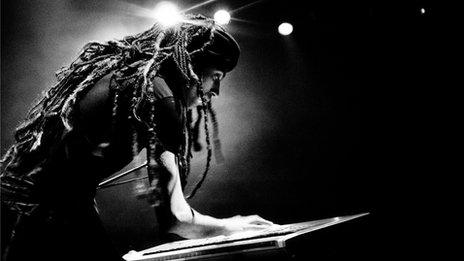World music Israeli style: Idan Raichel Project
- Published

"If I got an invitation to perform from the president of Syria or the prime minister of Lebanon, I would be the first to go," says Idan Raichel, one of Israel's biggest-selling musicians.
Right now that seems like a highly unlikely prospect, given the hostile relations between Israel and its neighbours to the north.
But it is typical of the vision of the 33-year-old from Kfar Saba, near Tel Aviv, to use music to knock down barriers and break through borders.
"I would love to see for the first time Lebanese, Syrian, Palestinian and Iranian musicians playing with Israeli artists, without fear from their governments," he told BBC World Service.
It is this kind of talk that led one British newspaper to dub him a "one-man Middle East peace accord".
It is a label that has stuck, though Idan Raichel himself has a somewhat ambivalent attitude.
"It sounds too cheesy - just do the real thing, do the music," he said.
'Street sound'
The music comes in the form of his multi-ethnic and multi-lingual musical collaboration, The Idan Raichel Project, which has sold close to half a million albums worldwide.
The most recent album, Within My Walls, has tracks in five different languages: Hebrew, Moroccan Arabic, Spanish, Cape Verdean Creole, and Swahili.
It brings together around 85 artists, most of them Israelis with roots in places as diverse as Yemen, Ethiopia, and the former USSR.
"It's the sound of the Israeli street," he says. "Every 10 or 15 years, there is new immigration that changes the face of Israeli society."
After his military service - during which Idan Raichel joined the army band - he worked at a boarding school for immigrant children, many of them young Ethiopian Jews newly arrived as part of Israel's right of return policy.
As the children had very little Hebrew language skills, and next to no knowledge of Israeli society, music became their common language.
The Idan Raichel Project started as he got together for music sessions with his neighbours and friends from Yemen and Ethiopia on a Saturday, when they would immerse themselves in traditional chants.
The first album was recorded in the basement of his parents' house.
His long dreadlocks date back to those early studio sessions, when one of the Ethiopian project members braided his hair for fun.
Cultural ambassador?
Since then, the Idan Raichel Project has toured Europe, the US, Australia, South Africa and Latin America.
Almost all the tracks are love songs. But some look for political meaning in his lyrics, wondering for example if the title track on the album Within My Walls is about the Israeli-Palestinian conflict.
Idan Raichel does not like to be drawn on this.
"Sometimes I really want to say yes or no, but once you release a song, it is no longer yours, each person is free to take from it whatever he or she feels," he says.
In 2007, he found himself embroiled in controversy over his decision to perform at a festival at an Israeli settlement in the West Bank, Gush Etzion.
The Israeli peace group Gush Shalom said by doing so, he was effectively giving his backing to the settlements, which are considered illegal under international law.
Idan Raichel stands by the decision: "By me performing there, it doesn't mean I agree, or not... I have 85 musicians in this project. Some are very right-wing, some are very left-wing. The project is bigger than me."
He adds: "Musicians should be able to perform anywhere without fear and without any judgement."
Some might call it idealistic, but Idan Raichel firmly believes educating people in the region about the art, culture and music of their neighbours is key.
"I wish Palestinian and Lebanese kids would learn about Hebrew culture, and that Israeli youngsters would learn about Palestinian art and Lebanese folklore," he says.
"Generation after generation in the Middle East is being raised to believe that on the other side of the border, there is an enemy.
"The first level of creating peace - a real peace, not just signing contracts - is about people and the culture of the people," Idan Raichel says.